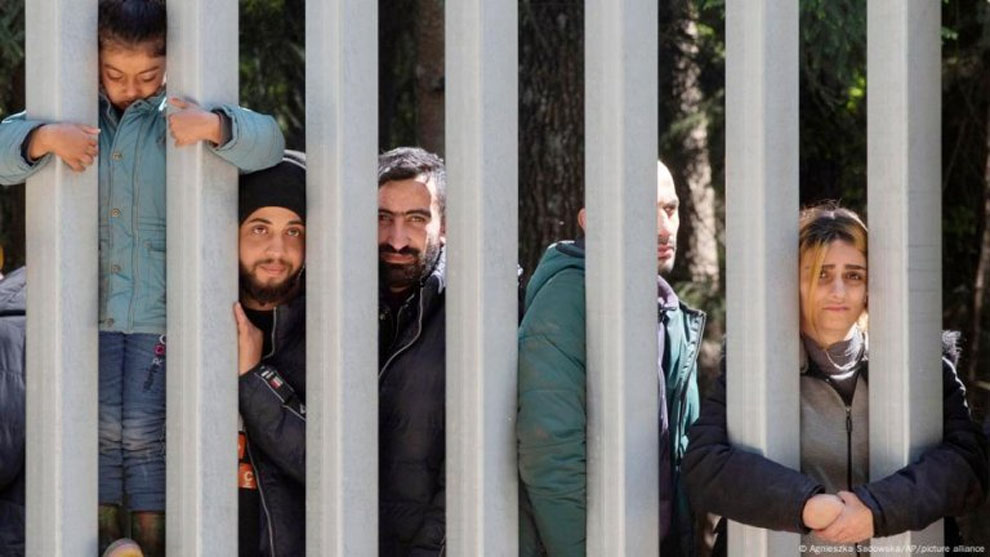International
US issues more sanctions over Israeli ‘settler violence’ in West Bank

US issues more sanctions over Israeli ‘settler violence’ in West Bank
The United States has imposed sanctions on an Israeli settler group and a civilian security guard in the occupied West Bank amid intensifying violence against Palestinians in the territory.
The sanctions on Wednesday targeted Hashomer Yosh, which describes itself as a volunteer organisation that aims to “protect” Israeli farmers in the West Bank, and Yitzhak Levi Filant, the civilian security coordinator of the Yitzhar settlement, south of Nablus.
“Extremist settler violence in the West Bank causes intense human suffering, harms Israel’s security, and undermines the prospect for peace and stability in the region,” the US Department of State said in a statement.
“It is critical that the Government of Israel hold accountable any individuals and entities responsible for violence against civilians in the West Bank.”
It said Hashomer Yosh fenced off the Palestinian village of Khirbet Zanuta earlier this year, preventing its displaced residents from returning to their homes.
Several Israeli media outlets have reported that Hashomer Yosh has received financial support from the Israeli government.
Washington also accused Filant of engaging in malign activities, including setting up roadblocks and conducting patrols earlier this year “to pursue and attack Palestinians in their lands and forcefully expel them”.
The sanctions freeze the assets of Filant and Hashomer Yosh in the US and bar American citizens from engaging in financial transactions with them.
For years, Hashomer Yosh was able to raise funds in the US, including through JGive, a website that gathers donations for groups the Israeli government certifies as charities.
READ ALSO:
- Brazil’s top court threatens to ban Elon Musk’s X
- JUST IN: NCC gives final deadline for NIN-SIM linkage
- Woman allegedly stabs neighbour for having affairs with her husband
Hashomer Yosh’s page on JGive appeared to be disabled on Wednesday. The website did not immediately respond to Al Jazeera’s request for comment.
Wednesday’s measures come one day after a settler attack killed one Palestinian and injured three others near Bethlehem. Earlier in August, violent settlers also ravaged the village of Jit in the northern West Bank, killing a 23-year-old man.
The ransacking of Jit sparked international outrage and even verbal condemnation from Israeli officials. But Israel rarely ever criminally charges settlers for violence against Palestinians.
Moreover, Palestinian rights advocates say settler assaults happen under the watch – if not cooperation – of Israeli soldiers in the area.
Democracy for the Arab World Now (DAWN), a US-based rights group that previously called for sanctions against Filant, welcomed Wednesday’s measures and urged penalties against Israeli officials involved in settler violence.
“Targeting the notorious Yitzhar security officer, Filant, is an important step in recognizing the institutional and state-backed nature of settler violence,” Michael Schaeffer Omer-Man, director of research for Israel-Palestine at DAWN, said in a statement.
“The sanctions will never put an end to settler violence unless they start targeting the state institutions and politicians who treat settlers as a tool of their expansionist policies.”
Israeli political analyst Akiva Eldar said the US sanctions are “too little and maybe even too late”.
Eldar blamed far-right elements in the Israeli government, which he compared to ISIL (ISIS), for enabling settler violence.
“There are Jewish supremacists sitting in the cabinet meetings, and what they want is chaos. They are not afraid of the international community,” he told Al Jazeera.
This year, the US and some of its Western allies have sanctioned several violent settlers whom they describe as “extremists”.
But the administration of President Joe Biden has maintained its staunch support for Israel. Washington, which backs the Israeli army’s war in Gaza and deadly raids in the West Bank, authorised a $20bn arms deal with Israel earlier this month.
Earlier on Wednesday, the Israeli military launched a large-scale offensive in the West Bank that has killed at least 10 people.
Israel’s Foreign Minister Israel Katz called on Wednesday for the “temporary evacuation of Palestinian civilians” in the West Bank to allow for the military operation, prompting fears that Israel may be planning for mass displacement orders in the territory.
The vast majority of the international community considers Israeli settlements in the West Bank illegal. The settlement enterprise in the area captured by Israel in 1967 breaches the Fourth Geneva Convention, which prohibits the occupying power from transferring “parts of its own civilian population into the territory it occupies”.
The Biden administration says the settlements are “inconsistent with international law”.
US issues more sanctions over Israeli ‘settler violence’ in West Bank
International
$100m coin collection buried for decades to be auctioned

$100m coin collection buried for decades to be auctioned
A coin collection, much of which remained buried underground for over 50 years, is expected to surpass $100 million at auction, according to experts.
Named the Traveller Collection, this extraordinary assemblage is believed to be the most valuable coin collection ever brought to auction.
The coins will be sold gradually over the next three years, with the first auction set for May 20.
Beyond its immense value, the collection’s origins make for a fascinating tale.
Spanning over 100 territories and encompassing coins from ancient times to the modern era, the collection is being auctioned by Numismatica Ars Classica.
What sets it apart is that most of the coins remained hidden underground for half a century before resurfacing.
According to a press release shared with CNN, the anonymous collector behind the collection began acquiring gold coins after the Wall Street Crash of 1929.
Over time, he developed “a taste for coins with great historical interest, beauty and rarity” and eventually amassed approximately 15,000 coins.
During the 1930s, he and his wife traveled extensively across the Americas and Europe, acquiring rare and historically significant coins while meticulously documenting their purchases.
READ ALSO:
- EFCC re-arraigns son of ex-PDP chairman for alleged N2.2bn oil subsidy fraud
- Group says Natasha’s recall will deepen democracy
- We welcome Gov Makinde’s U-turn on Shari’ah panel – MURIC
Despite settling in Europe at a time when Hitler’s Nazi party loomed over the continent, the collector sensed the impending danger. In response, he carefully packed the coins into cigar boxes, which were then placed inside aluminum containers and buried underground, where they remained undisturbed for five decades.
Among the collection is a 50 Toman coin, part of an “exceedingly rare” set minted in Tehran and Isfahan during the late 18th and early 19th centuries.
International
AI will replace doctors, teachers, others in 10 years – Bill Gates

AI will replace doctors, teachers, others in 10 years – Bill Gates
Bill Gates, a co-founder of Microsoft, has claimed that improvements in artificial intelligence (AI) over the next decade may render humans superfluous for the majority of work.
In a recent interview with comedian Jimmy Fallon on NBC’s The Tonight Show in February, the billionaire philanthropist discussed how AI may take over many facets of life and business.
Gates remarked that expertise is currently “rare”, emphasising the continuous reliance on human specialists in industries such as medicine and education.
For example, we continue to rely on highly trained individuals, such as “a great doctor” or “a great teacher”, whose knowledge cannot be simply replaced by AI.
However, “with AI, over the next decade, that will become free, commonplace — great medical advice, great tutoring,” Gates said.
READ ALSO:
- Senate seeks FG’s immediate intervention to slash data prices
- Reno Omokri: Nigeria gives more opportunities than US, Britain, Canada
- Driver remanded for causing Osun varsity students’ death
In other words, Gates believes that the world is entering a new era of “free intelligence”, as he described in a recent interview with Harvard University professor and happiness specialist Arthur Brooks.
According to Gates, this transition will result in rapid breakthroughs in AI-powered technology, making them more accessible and affecting almost every part of our lives.
These breakthroughs will vary from more effective treatments and diagnoses to widely available AI instructors and virtual assistants.
“It’s very profound and even a little bit scary — because it’s happening very quickly, and there is no upper bound,” Gates told Brooks.
The discussion of how humans will fit into an AI-powered future continues.
Some analysts suggest that artificial intelligence will improve human productivity rather than completely replacing labour, hence driving economic growth and creating new jobs.
However, Microsoft AI CEO Mustafa Suleyman cautions that technological improvements in the coming years will disrupt the nature of most occupations across nearly all industries, potentially exerting a “hugely destabilising” influence on the workforce.
AI will replace doctors, teachers, others in 10 years – Bill Gates
International
Poland suspends migrants’ right to apply for asylum

Poland suspends migrants’ right to apply for asylum
Poland has temporarily suspended the right of migrants arriving in Poland via its border with Belarus to apply for asylum.
Prime Minister Donald Tusk announced it would be happening after the controversial bill, which will allow Polish authorities to suspend this right for up to 60 days at a time, was signed into law by President Andrzej Duda.
Tusk had said it would be adopted “without a moment’s delay” while Duda said the changes were needed to strengthen security on the country’s borders.
But the law has been criticized by rights groups including Human Rights Watch, which said the EU should take legal action against Poland if it was implemented.
The group urged the country’s parliament last month to reject the bill, saying it “flies in the face of Poland’s international and EU obligations” and could “effectively completely seal off the Poland-Belarus border, where Polish authorities already engage in unlawful and abusive pushbacks”.
READ ALSO:
- Trump slaps 25% tariffs on car imports to US
- Reps pass bill to strip Vice President, governors, deputies of immunity
- Businessman collapses in court during trial over $578,000 cash seizure
The government said previously the suspension would only be applied temporarily to people who pose a threat to state security, for example large groups of aggressive migrants trying to storm the border.
Exemptions will be made for unaccompanied minors, pregnant women, the elderly or unwell, anyone exposed to “real risk of serious harm” by being returned and citizens of countries accused of conducting the instrumentalization of migration – like Belarus
Tusk has dismissed criticism from human rights groups.
“Nobody is talking about violating human rights, the right to asylum, we are talking about not granting applications to people who illegally cross the border in groups organised by Lukashenko,” he said in October.
Since 2021, Poland, Lithuania, Latvia and Finland have seen a huge increase in the number of people crossing into their countries illegally from Belarus and Russia.
Polish authorities have sent thousands of troops and border guards to police its border with Belarus and built a 5.5-metre-high steel fence along 186 km of the frontier where at times several thousand migrants have been left stranded.
Rights groups estimate more than one hundred people have died on the borders between Belarus and Poland, Lithuania and Latvia since 2021.
EU eastern flank countries and the European Commission have accused the Belarusian and Russian authorities of weaponising migration to create a new route into the EU to destabilize the bloc.
Poland suspends migrants’ right to apply for asylum
BBC
-

 metro1 day ago
metro1 day agoRivers administrator Ibas fires Fubara’s political appointees
-

 metro1 day ago
metro1 day agoJUST-IN: Ex-Oyo gov Ajimobi’s first child Bisola dies At 42
-

 International2 days ago
International2 days agoCanada removes bonus ranking points for job offers in Express Entry system
-

 metro2 days ago
metro2 days agoHow ritualists, native doctor drugged, murdered underage sisters in PH – Police
-

 Sports3 days ago
Sports3 days agoNigeria’s Super Eagles falter in W’Cup qualifiers against Zimbabwe, S’Africa lead, Egypt, Morocco qualify
-

 metro1 day ago
metro1 day agoFG declares public holidays for Eid-el-Fitr
-

 metro3 days ago
metro3 days agoAkpabio has habit of abusing women, says Atiku
-

 Africa1 day ago
Africa1 day agoNiger coup leader sworn in as president for five years











